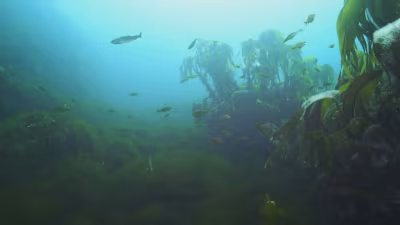ITV
A group of leading ocean experts call for an end to the “ongoing destruction of our oceans by fishing” and say the current definition of sustainable fishing is “dangerously flawed”.
In a paper published in the journal Ocean Sustainability, the researchers call for stricter rules on fishing, as they say many products marketed as sustainable are not.
The study says companies and legislation needs to do more to protect ecosystems and fisheries – and should take climate change into consideration.
Fishing is the leading cause of ocean destruction, with fish populations fallen by a third in the last 50 years.
Researchers have laid out 11 “golden rules” which they say would help renew fish populations in order to feed future generations.

These include limiting the size of boats and equipment, incorporating ecosystem protection into fisheries management and ending “harmful subsidies” to fisheries.
Professor Paul Kemp, from the University of Southampton and a co-author of the paper, said: “This initiative brought together a diverse group of experts, including those from fisheries science, social sciences, economics and conservation.
“By doing so we were able to develop a roadmap to move away from the traditional view of fisheries that tends to focus on the social and economic context of those who utilise them.
“Sustainability, however, requires the integration of the social, economic and environmental domains. This paper provides a manifesto that will help secure our fisheries for sustainable exploitation by future generations.”

Other proposed rules including fishing less for lower impact, sourcing only from fisheries with good governance and sustainable stocks and placing the most vulnerable species and areas off limits.
They also call for the creation of fisheries management systems that fairly and transparently distribute access and benefits, apply good practices wherever fishing companies operate and apply zero-tolerance to companies that engage in illegal fishing.
The researchers say that current standards of sustainability support “high-capital industrial practices which benefit the Global North” but which harm ecosystems and jeopardise “artisanal fishing, food security, and jobs”.
Lead author Professor Callum Roberts, of the University of Exeter, said: “The current concept of ‘sustainable fishing’, adopted by governments and private actors since the post-war period, is scientifically obsolete.
“It relies on a simplistic, productivist theory which assumes that as long as global catch volumes remain below a set limit, anyone can fish just about anything, anywhere, with any method.”
The paper calls on policymakers, retailers, and fishery managers to acknowledge the failings of current fishing practices and prioritise the adoption of the proposed golden rules with supermarkets having a “pivotal role” in any change.


